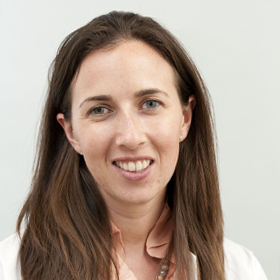TBI is a multi-faceted injury that can present physically through headaches, balance, hearing, or vision problems; psychologically through depression or post-traumatic stress; cognitively through memory and attention issues; or all or a combination of these “buckets.” Home Base is a two-week intensive program for veterans and service members that serves as part of their journey to recovery. After the two weeks, case managers help their clients set up the necessary care and services they need in their community and follow their progress.
Dr. Mary Alexis Iaccarino is director, Clinical TBI and Brain Health Services, Home Base
For information about treatments for brain injury please visit The Treatment Hub.
TBI can be a very complex and multi-faceted injury. So, there are different, what we call phenotypes, or different sort of buckets of how it can present. Some people will have a predominance of physical symptoms such as vision, hearing problems, headaches, dizziness, balance problems. Some people might have a primary psychological component where they’re experiencing anxiousness, depression, traumatic stress, perhaps all rolled together. And then other folks might have a very cognitive type picture where their primary difficulties are around memory, attention, organizing themselves. So, we try first to get an understanding of what the major issues are. And for some people it’s all, it’s everything. It’s really everything. But we try to break it down into what we think are the drivers for how people are feeling. And then we attack them individually by getting people headache treatment, putting them in physical therapy for their dizziness and their balance. Looking at cognitive rehabilitation as a really phenomenal intervention for improving people’s memory, attention, organizational skills. And then of course wrapping it with treatment of traumatic stress, anxiety, depression and really helping people understand how all these pieces can be intertwined. So, we really designed multimodal, multidisciplinary rehab programs that try to get at these various facets. It’s a lot to tackle in two weeks. And what we tell patients, is that this might be the start of your journey, or maybe it’s the middle of your journey. Maybe you’ve already started engaging in TBI-related care at home, but you’re not getting the results you want, or you’re now just recognizing that TBI is a problem for you. So, we think a lot about our two-week program as a part of someone’s journey. We make a lot of progress there, but we know that actually a strong part of what we do is developing really comprehensive after-care planning as well. So that when people are done for two weeks, they have a plan for outpatient care so that they can continue treatment. And we work very hard to make sure those plans are in place, so people get what they need. What we’ve learned is that taking that approach that we’re going to give you this highly focused accelerated treatment and then back it up with good case management and with finding experts in your community who can continue the work, that people get the most traction. We’ve seen in our program one of our treatment programs that about 90 percent of people who leave the program continue to engage in mental health care. About 80 percent continue to engage in their physical therapy. And when we follow those people over time, we see better outcomes. So we know that this is not going to be a short or easy process for folks. We’re here to provide expert intensive care, but often we’re a part of someone’s journey. And so we try to help people both when they’re at Home Base and as they leave Home Base. BrainLine is powered in part by Wounded Warrior Project to honor and empower post-9/11 injured service members, veterans, and their families.
About the author: Mary Alexis Iaccarino, MD
Mary Alexis Iaccarino, MD, is a board-certified physiatrist with sub-specialty training in brain injury medicine. Her clinical and research areas of interest include diagnostic and treatment strategies in mild traumatic brain injury including blast and sport-related concussion. Dr. Iaccarino joined the Home Base team in 2016 as a brain injury physiatrist for the Intensive Clinical Program (ICP) and outpatient TBI program. Her goal is to provide comprehensive, evidenced-based brain injury care to veterans through multidisciplinary collaboration with psychology, neuropsychology, physical therapy, psychiatry, and other specialists. She specializes in the treatment of physical, cognitive, and behavioral deficits that occur after brain injury including headaches, pain, dizziness and vision symptoms, sleep difficulties, fatigue, concentration, and memory problems.

